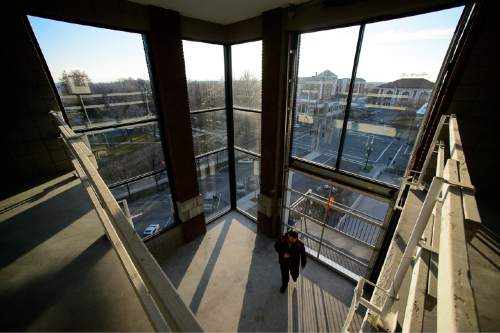This is an archived article that was published on sltrib.com in 2015, and information in the article may be outdated. It is provided only for personal research purposes and may not be reprinted.
It looks to be a holiday for some developers in Salt Lake City.
At the urging of Mayor Ralph Becker, the City Council in a 4-2 vote Tuesday suspended for 12 months impact fees assessed on new development.
The move comes several weeks after the administration's announcement that City Hall is having difficulty coordinating the collection of impact fees for the construction of new parks, fire houses and other public amenities.
City planners will use the one-year period to create a new system that would ensure that those funds are spent in a timely fashion — state law requires that such expenditures be made within six years of collecting them. Officials also may consider other options, including how to set fees, or how they might waive them in some cases.
The moratorium, which will go into effect Nov. 2, comes after the council ratcheted up impact fees in February 2014. In April of that year, the council dialed them back a bit in the face of harsh criticism from builders and business leaders.
Developers bringing projects to City Hall during the moratorium, no doubt, will be the beneficiaries of a substantial discount.
Impact fees are designed to maintain municipal service levels as populations grow. The funs can be used for streets, parks and public-safety projects.
The money cannot be used for maintenance of existing facilities.
The split vote mirrored strong feelings on both sides of the unusual moratorium.
Council members Charlie Luke, Lisa Adams, James Rogers and Stan Penfold voted in favor of the timeout.
Kyle LaMalfa and Erin Mendenhall opposed it. Council Chairman Luke Garrott, who earlier voiced opposition to the moratorium, was absent.
In an interview, Mendenhall said she was not persuaded that a moratorium was necessary to fix the problem.
"This moratorium does not stop the need or the growth. We'll have less money for growth," she said. "Impact fees are necessary. This doesn't make sense."
In the end, taxpayers would have to make up for impact-fee shortfalls. The Becker administration, however, has said it has enough unspent impact fees on hand to bridge the moratorium.
In an interview Monday, Garrott said the council raised impact fees in 2014 to ensure service levels don't sag as the city's population grows.
"I thought it was good planning," he said of projected growth. "We knew a building boom was coming."
By contrast, Charlie Luke said the moratorium is advisable.
"I have no problem collecting impact fees. But if we are going to collect money, we have to figure out how we can spend it," he said in an interview. "The moratorium gives us a chance to develop a better policy."
Adams said it's time to "take a deep breath and do this appropriately."
She pointed to impact fees that have not been spent and had to be returned to developers. Adams also noted that Salt Lake City's impact fees are too onerous and drive new businesses elsewhere.
The Becker administration has been working to improve the system over the past two years, said Jill Love, director of community and economic development. But the building boom has complicated matters.
"We have accumulated enough money that it's difficult to spend," she said. "And it's become increasingly more difficult. We have a booming economy."
She also noted that City Hall has heard from business leaders who said other municipalities are better at using impact fees on public amenities near new buildings that generated the levies.
"They are frustrated with how we collect and spend the impact fees," she said. "In other communities, they see immediate impact in the area of development."
Impact fees should be "used as a tool to build the kind of city we want," said Jason Mathis, executive director of the Downtown Alliance business group, which supports the moratorium. The levies could be used as an incentive for the type of development city leaders seek.
"Impact fees should be used strategically and thoughtfully," he said. "The current fees are neither."
But Jackie Biskupski, who is running against Becker this fall, said a moratorium is bad public policy. She agrees that impact fees are too high in Salt Lake City, but she said a moratorium is neither fair nor just.
"To eliminate impact fees for a full year creates a tenuous dynamic in our community," she said. "We are giving the benefit to new developers and not those who paid too much to begin with."



